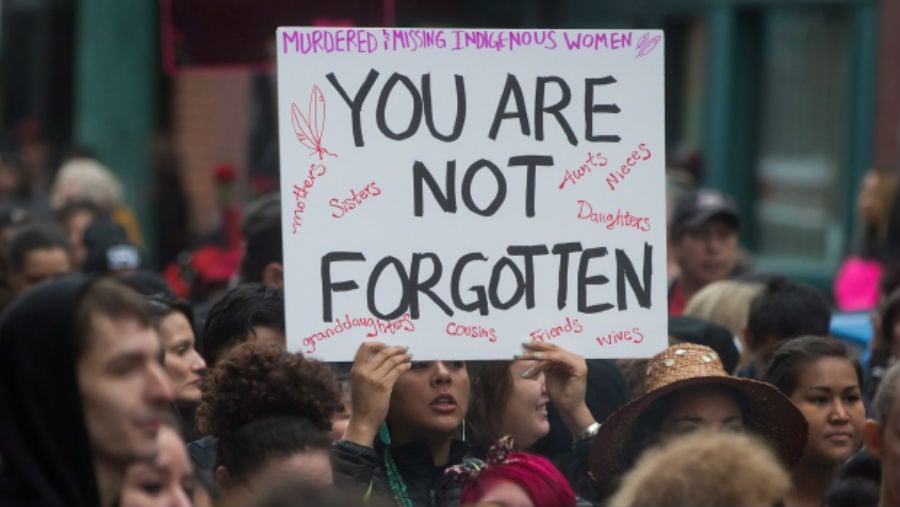Support strong Canadian climate journalism for 2025
Fuelled by an unprecedented commitment to First Nations, the Liberal government’s announcement of the start to an inquiry into missing and murdered Indigenous women serves as signal to those who have dismissed its importance to get out of the way.
This is long overdue and it’s happening.
Victims relegated to the sidelines. Devalued as second-class Canadians. Ravaged by poverty, genocide, suicide, and racism. Denigrated and dismissed by previous governments. Failed by police sworn to serve and protect all. Disrespected by previous inquiry processes that were supposed to solve the problem. Few in our country have been willing to own that our racism and callous disregard created the very conditions that made these women victims in the first place.
The families of these women had so many reasons to give up — but they did just the opposite.
Many will assume this inquiry is a new development, precipitated by a government eager to engage with Indigenous peoples in ways that validate their role as First Peoples in our country, but this inquiry is the result of the unrelenting work of mothers, sisters, daughters, and friends over many years when there was little hope for optimism. I doubt you’ll see them giddy at today’s announcement, merely cautiously optimistic, braced for the kind of disappointment they have come to live with over their history.
Make no mistake. Indigenous people made this inquiry happen. It has not been gifted to them by a new, magnanimous overlord. Don’t get me wrong – Justin Trudeau’s understanding of the need to stop this carnage and of the damage ignoring this issue has done was central to this process, but these Indigenous women forced this issue into the consciousness by never, ever letting us forget. Each opposition party promised an inquiry should they win the 2015 election thanks to the voices of Indigenous women, while Stephen Harper’s Conservatives remained tone deaf to the issue.
We should all be ashamed that this is what it took, but you won’t hear these women say that; they have eschewed the negative, eyes steadfastly focused on the ultimate goal of truth and reconciliation for loved ones taken horrifically and far too soon. Many have lost the people who mattered most to them; they can ignore the racist, sexist volleys because nothing is as painful as what they’ve been through.
Perhaps you’re asking yourself if the cost is necessary. As a former police detective of over twenty years, I can tell you policing is a notoriously – and understandably – reactive business, and police are famously short sighted. If something bad didn’t happen on their watch, they shake their heads, cluck their tongues and utter platitudes deploring the unfortunate predicaments their predecessors found themselves in, and assure us similar mistakes will never be made again. They fail to show us what has changed, because little has. Without policy changes to the way police and social service business is done, nothing will change. Women go missing and die, killers walk free, and families’ suffering continues.
All of these things cost money. Big money. One case at a time. You pay now, or you pay later.
The British Columbia Missing and Murdered Commission of Inquiry (MMCI) was a massive failure and arguably more damaging to victims and families than had it not happened. It failed because it was done on the cheap, with poorly-defined terms of reference designed to avoid the issues it was intended to address. Families and their concerns were frozen out and many were traumatized in the process. Lawyers were hamstrung from fully cross-examining police witnesses because of time constraints.
The MMCI vacillated between a study commission and a trial of police and failed at both. No accountability for those police found negligent and no teeth to implement over sixty recommendations. This commission was a waste of money, not because the subject matter wasn’t worthy, but because the B.C. government grudgingly called it, hoping to appease families and shut activists up. Obviously, it backfired and further galvanized the women to keep pushing, to keep demanding their loved ones’ deaths be properly investigated.
Do any of us need a sister/mother/daughter to point to and say, “that could be mine out there” in order to justify this inquiry? Are we that bereft of empathy that we can only conjure it up if we have our own loved one to look to in order to validate this long-overdue investigation into how we have failed and how we can stop the killing? These are human beings, loved and worthy of our time, energy, and care, whether we have one of our own in our lives, or not. Some were not Indigenous, but does that matter?
We failed them all.
Justice Minister Jody Wilson-Raybould, Indigenous Affairs Minister Carolyn Bennett, and Status of Women Minister Patty Hajdu have all vowed to review the recommendations and mistakes of the MMCI, as well as the fifty-plus other studies and reports on missing and murdered women produced in Canada over the years. Their pledge to consult with the victims’ families and take counsel from them is a welcome change from past processes and one can only think this is due in large part to this process being women-led.
Leave it to the women, supported by so many good men, and they will get it done. Indigenous women have known this for centuries. Idle No More. Sisters in Spirit, Walk4Justice, Women’s Memorial March, Butterflies in Spirit – these are but a few of the organizations who fought and spoke out for so many years, demanding this inquiry.
We all owe it to them to do it right.





Comments